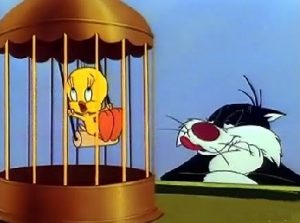Courage, humility, and Sylvester & Tweety Bird
We continue this month’s celebration of inspirational pieces and sermons by congregants. The post below is by Scott Troyer, a Mennonite congregant and blogger at:
The Divine Pull: Moving Toward Justice.
Scott and his wife Allison, graduates of Bluffton University in Ohio, have generously given of their time and talents to the youth at Cincinnati Mennonite Fellowship. We are not only grateful but amazed at their energy and their many kindnesses.
The following is a serious subject couched in the milieu of Looney Tunes! (I knew they meant more than they appeared to.)
____________
About his blog, Scott says: This blog is a personal writing exercise that explores the idea that the world is constantly being pulled in the direction of justice and mercy, in spite of human attempts to the contrary. I am a part of the Mennonite tradition, so many of my posts are inspired or informed by the Mennonite world.
____________
I tawt I taw some inequality!
Recently, as I was staying with my parents for a bit, the internet began having problems. Unable to do anything requiring an internet connection, and with nothing of interest to me on the television, I turned to their DVD of Looney Tunes classics for entertainment. The first disc contains a number of Sylvester and Tweety episodes, which, for several years, have reminded me of my sister’s opinion of that type of cartoon. You know, the one where a predator is chasing his prey, only to be outsmarted and usually injured by said prey. Tom and Jerry and the Road Runner and Coyote are two other classic cartoons of this genre.

I love these cartoons. I love seeing the foolish predator outwitted by the clever prey. My sister, however, identifies with the cat. She sees a poor animal doing what it naturally does (hunting for food) and being beat up by a much smaller creature with almost supernatural strength and abilities. In some cases, particularly in Tom and Jerry, the cat doesn’t even start out chasing the mouse. He is just minding his own business.
So which narrative is it? Is an innocent creature getting the best of his aggressive pursuer? Or is the cat being unfairly punished for doing what cats do?
Living in a first-world superpower like the United States, many people like myself might identify more with Tweety. We mind our own business, do what’s best for us, and are victims of those who don’t have what we have. We are safe, separated from the “other.” This sentiment is articulated by Tweety in a few episodes, when he sings “I’m a sweet little bird in a gilded cage; Tweety’s my name but I don’t know my age; I don’t have to worry and that is that; I’m safe in here from that old puddy tat.”
But now I begin to see my sister’s point. Great inequality exists between the two characters, making these episodes difficult for me to watch as an adult. Sylvester sees someone with privilege, someone who has more than he does, and who has respect and means. He sees someone in a gilded cage telling the world all about their wealth and security, while he sits there in need, expected to be content with his lot in life. So, he tries to obtain that which the bird in the gilded cage is singing about. Yet, at every step, he is thwarted by those who are privileged. It seems unfair. In some cases, the bird and his allies act out violently against Sylvester. In others, it seems as though some divine power is acting against the cat, like when Tweety miraculously vanishes, or when the world around Sylvester changes without warning, or even when Granny intervenes on behalf of the privileged. Yet other times, Sylvester is the author of his own destruction, as risky, violent, and poorly-thought-out plans backfire. No one advocates for the cat. He is undeserving of the privileges granted to the bird. He is the villain simply because he is a cat, and cats eat birds. He may not be adequately provided for, and when he tries to feed himself, he is punished.

My intention here is to highlight the fact that this narrative can be interpreted multiple ways. I always identified more with Tweety, my sister with Sylvester. Perhaps she saw me as the privileged one. Perhaps she is just more capable of sympathizing with others than I am. For those of us who identify with Tweety, what can we do? Our situation is also an accident of birth. It’s not our fault that we were born with more than the cat. However, we don’t have to act like Tweety does. We don’t have to sing about our gilded cages, about how we don’t have to worry about life like the puddy tat does. We don’t have to demonize the other. Instead, we should use what we are given to help those in need. Recognize the injustice of the world, and work to correct that in whatever way we are able. The apostle John appears to agree, saying that “if anyone has material possessions and sees his brother in need, but has no pity on him, how can the love of God be in him? Dear children, let us not love with words or tongue but with actions and in truth.” (1 John 3:17-18).
____________
Thank you, Scott! You, and Addie Liechty last week, have written about recognizing privilege and adjusting our behavior accordingly. Important lessons indeed.
____________

Scott R. Troyer
Bio
Scott R. Troyer is pursuing a Ph.D. in musicology at the University of Cincinnati College-Conservatory of music. His MM thesis, entitled “Layers of Meaning: Intertextuality in Early Anabaptist Song,” received the University of Cincinnati’s Distinguished Master’s Thesis award in the humanities category and was submitted to the 2018 Midwestern Association of Graduate Schools Distinguished Master’s Thesis Competition on behalf of the University. His primary research interests concern music-text relationships and musical references in the sixteenth century. In 2017, he worked as a musical analyst for the Citations: The Renaissance Imitation Mass project creating a searchable online database of musical citations in the imitation mass repertoire.
____________
I welcome your comments: gretaholtwriter.com/blog.
{Thank you to my niece, Addie Liechty, for taking the picture that is this blog’s featured image. Her blog is: https://addieswriting.wordpress.com.}
Best wishes and have a good week.
Greta
Greta! Fabulous post! There is always more than what meets the eye–especially when our vision is clouded by our own experiences and judgements! Thanks so much for showing a different perspective (thank your sister for me too!). We all need to take a look at how we are contributing to the divisive climate in the country and open up more room for compassion. And, definitely, “we should use what we are given to help those in need. Recognize the injustice of the world, and work to correct that in whatever way we are able.”
Diane
Thanks, Diane. We’re studying reconciliation in church now. Compassionate action seems a discipline!